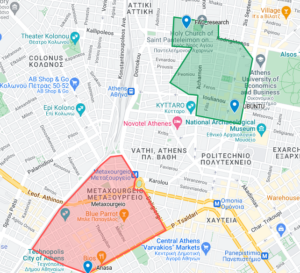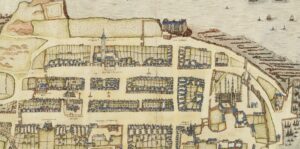Decolonising the City (DtC) is a Knowledge Mobilisation Award funded by the Urban Studies Foundation (USF). DtC follows on from our 2019 USF seminar series (Copenhagen, Barcelona, Athens), which brought together academics and practitioners to examine existing migrant welcoming practices and reached two findings. First: academic knowledge needs to be co-produced with the communities it addresses, in ways that are inclusive, relevant and useful to them. Second: this very idea of “urban belonging” is rapidly changing. In this moment of dual transition, migrants settle in European cities (often not their preferred destination) while receiving societies are faced with the legacies of their colonial past.
PROJECT PURPOSE
With these two findings in mind DtC constitutes a series of small-scale field-based interventions aiming to reimagine, together with migrant communities, what “decolonising” urban citizenship means in practice. Our key aim is to generate a participatory arts-based methodological toolkit, co-designed with migrant communities, that will help explore how migrants practice urban citizenship. This KMA grant is focused on migrant communities of African descent in Athens, Greece. We believe this is a vitally important exercise vastly exceeding the city itself, potentially contributing to rapidly growing calls to decolonise the academy, this time from an urban and migrant-focused perspective.
For this short study, we will collaborate with Ubuntu and Anasa: two cultural organisations representing the Afro-Greek communities active in central Athenian neighbourhoods. DtC focuses on Athens for two reasons. First, the city is both at Europe’s periphery and centre: the “birthplace of civilisation” in European imaginaries (Gourgouris 1996; Stenou 2019) is nevertheless at the continent’s edge – geographically, culturally and politically. Athens is therefore both an epicentre of the imagined geography (Said 1979) that gave birth to orientalism, and itself at the receiving end of ensuing colonial and post-colonial transformations. Second, Athens has accommodated thousands of migrants who are unable to move further across the continent, settling in a city itself rattled by more than a decade of consecutive crises (from debt to migrant reception and now Covid-19). In these two ways, Athens exemplifies how colonial imaginaries and legacies intertwine with urban exclusion today.

Figure 1: Map of DtC project neighbourhoods, organisations and key sites in Athens (Google Maps)
RESEARCH DESIGN
Following the theoretical trajectories of the “epistemologies of the South”, introduced by de Sousa Santos (2014), we will develop a methodological toolkit to decolonise urban knowledge. Our methodological toolkit will be constructed via an interdisciplinary, decolonial, intersectional feminist and participatory approach, together with the communities on the ground.
In DtC we will design and test out a participatory arts-based research methodology (PABR, see Nunn 2020) pointing to the contribution and transformative power of creative arts for advocacy and research on citizenship. The growing emphasis on participatory and interdisciplinary arts-based methods is nevertheless largely limited to the Global North. By contrast, DtC adapts this methodological approach to the context of the epistemologies of the South to decolonise academic research with migrants and to provide an inclusive and intersectional research tool for the study of urban citizenship.
The team of researchers includes Anna Papoutsi (Birmingham), Penny Travlou (Edinburgh) and Antonis Vradis (St Andrews).

